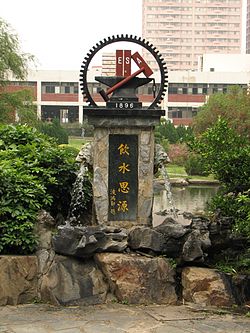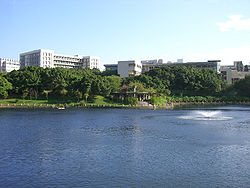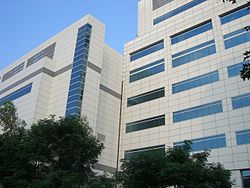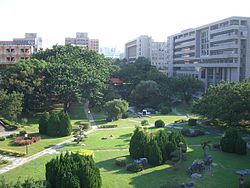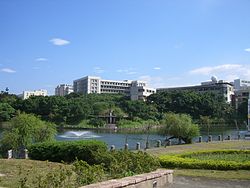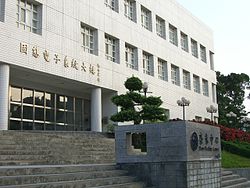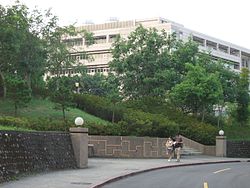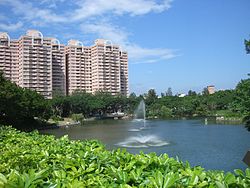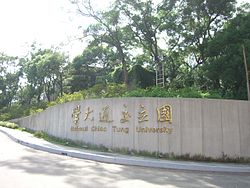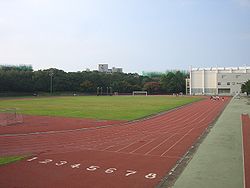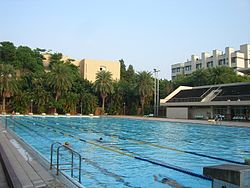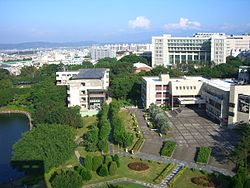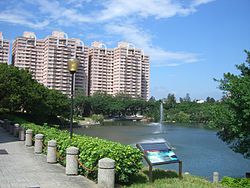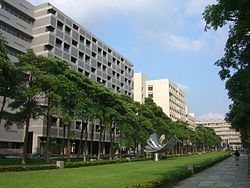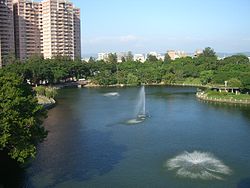- National Chiao Tung University
-
National Chiao Tung University 國立交通大學 
Motto 知新致遠 崇實篤行 (Chinese) Established 1958 (Founded: 1896) Type Public President Dr. Yen-Hwa Wu (吳妍華) Academic staff 588 Undergraduates 4786 Postgraduates 7505 Location Hsinchu City, Taiwan, Republic of China Campus Suburban Affiliations University System of Taiwan Website (Chinese) (English) National Chiao Tung University Traditional Chinese 國立交通大學 Simplified Chinese 国立交通大学 Transcriptions Mandarin - Hanyu Pinyin Guólì Jiāotōng Dàxué Min - Hokkien POJ Kok-li̍p-Kau-thong-tāi-ha̍k National Chiao Tung University (NCTU) is a public university located in Hsinchu, Taiwan. It is recognized as one of the most prestigious and selective universities in Taiwan and is renowned for its research and teaching excellence in electrical engineering, computer science, engineering, management, and social sciences. NCTU is Taiwan’s oldest university. Originally established in Shanghai in 1896, the University was moved to Taiwan by former Chiao Tung University faculty and alumni in 1958.
NCTU is among the world leaders in engineering and scientific journal publications. According to a 2009 ARWU Academic Ranking of World Universities, NCTU ranks 38th in Computer Science.[1] It also ranks 45th worldwide in the engineering field. NCTU in Taiwan, along with its sister campuses, such as Shanghai Jiao Tong University in mainland China, comprise the largest alumni network in the entire Asia/Pacific region and draws students from over 42 countries around the world. It is considered a highly competitive university and the admission is exceedingly selective.
The University’s main campus is located right at the center of the Hsinchu Science Park, Taiwan’s national research center. The area is commonly referred to around the world as the Silicon Valley of Asia. More than 400 technology companies have been established in the park, which is now the world’s most significant area for semiconductor research and manufacturing.
In recent years, the number of international students attending the university has increased, due in part to the growing number of partnerships and collaborations with top universities throughout the world.
Contents
Academics
Electrical Engineering
The Electrical Engineering department at NCTU is on the cutting edge of research and partners with numerous corporations in the development of new technologies. Based on the Academic Ranking of World Universities conducted by Shanghai Jiaotong University, NCTU ranks #1 in mainland China and Taiwan and is in the top ten in the Asia/Pacific region in the field of engineering. The University has often been described as the MIT of Asia, due in part to the strength of the Electrical Engineering program.
Computer Science
The Computer Science department at NCTU is recognized worldwide and has made significant contributions to the field. Based on the ESI (Essential Science Indicators) compiled by the ISI (Institute for Scientific Information), NCTU ranks 21st worldwide in the field of computer science. According to a 2009 ARWU Academic Ranking of World Universities in Computer Science, it ranks 38th.[2]
Business and Management
The Business and Management department at NCTU is highly competitive and is considered[who?] a premier grooming establishment for future leaders. Its MBA business program is fully AACSB accredited and is currently ranked in the top 5 programs throughout Asia by the business magazine Asia Inc. Their business alumni dominate the financial sector in Taiwan having graduated more top executives than any other university in the country. Its Global MBA program is truly multi-national with foreign students comprising fifty percent of the student base. The student body encompasses different nationalities from all over North America, Europe, South America and Asia each year. Many top students receive personal mentoring by current business executives through the University’s Alumni Mentoring Program.
Faculty and Alumni
NCTU’s faculty consists of some of Asia’s most well-known scholars in their respective fields. Many of its professors received their PhDs from the world’s top universities including Cambridge, Harvard, Stanford, Berkeley, MIT, Universities of London, Paris, and Tokyo. Currently, NCTU has more IEEE Fellows (16) on its faculty than any other university in Taiwan. A number of former faculty members now serve in prominent positions within the Taiwan government.
In addition to political involvement, NCTU alumni also dominate Taiwan's electronics, computer and business sectors with more than 500 Presidents and CEOs. Many prominent alumni return to their alma mater as visiting professors, giving back to the university that has given them so much. The impact of their commitment to the University is evident in the spirit of the student body which continually espouse the ideals of NCTU.
The NCTU alumni association organizes this event as well as many others and is involved in providing support to new graduates. Many senior alumni often help in this effort as the bond between fellow alums is exceptionally strong. This bond extends not only to NCTU alumni in Taiwan but also to the University’s sister campuses in mainland China. Every five years, alumni and representatives from the five schools gather for a celebration of academic achievement in an expression of solidarity.
Organization
NCTU consists of 9 colleges, ranging from Electrical Engineering to Computer Science to Management.
- College of Engineering
- Department of Mechanical Engineering
- Department of Civil Engineering
- Department of Materials Science and Engineering
- Institute of Environmental Engineering
- Institute of Nanotechnology (INT)
- College of Electrical Engineering
- Department of Electronics Engineering
- Department of Electrical Engineering
- Institute of Electro-Optical Engineering
- Display Institute
- Nao Facility Center
- Center for Telecommunications Research
- Lee and MTI Center fo Networking Research
- Degree Program of Electrical engineering and Computer science
- Electronic Engineering and Computer Science (EECS) Undergraduate Honors Program
- College of Management
- Department of Management Science
- Department of Transportation Technology & Management
- Department of Industrial Engineering & Management
- Institute of Global Masters of Business Administration
- Institute of Traffic and Transportation
- Institute of Business & Management
- Institute of Information Management
- Institute of Management of Technology
- Institute of Technology Law
- Legal Center for Enterprise & Entrepreneurship
- Executive Master of Business Administration
- Semiconductor Manufacturing Management Center
- Graduate Institute of Finace
- Department of Information & Finace Management
- College of Computer Science
- Department of Computer Science
- Institute of Computer Science and Engineering
- Institute of Network Engineering
- Institute of Multimedia Engineering
- Electronic Engineering and Computer Science (EECS) Undergraduate Honors Program
- College of Science
- Department of Electrophysics
- Department of Applied Mathematics
- Department of Applied Chemistry
- Institute of Molecular Science
- Institute of Statistics
- Institute of Physics
- Degree Program of E-Learning
- International Graduate Programs
- College of Biological Science and Technology
- Department of Biological Science and Technology
- Institute of Biochemical Engineering
- Institute of Bioinformatics
- Institute of Biomedical Science
- College of Humanities and Social Sciences
- Institute of Communication Studies
- Film Studies Center
- Institute of Applied Arts
- Institute of Music
- Institute of Education
- Department of Foreign Languages and Literatures
- Institute of Teaching English to Speakers of Other Languages
- Language Teaching and Research Center
- Graduate Institute of Linguistics & Cultural Studies
- Graduate Institute of Architecture
- Center for Teacher Education
- Center for Emergent Cultural Studies
- Graduate Institute for Social Research and Cultural Studies
- College of Hakka Studies
- International Center for Hakka Studies
- Center of General Education
- Chalmers International Taiwan Office, CITO
- NCTU Europe at Chalmers
Libraries and Culture
The National Chiao Tung University Library System, centered in the main square of the university campus is home to the largest collection of English literature in Taiwan. With two entire floors dedicated to English texts it is larger than that of many English libraries at colleges in the United States. The library area is 32,000 square meters and is set in scenic surroundings with a Chinese garden. It has over 1,000,000 volumes of printed texts, more than 3,000 periodicals, over 10,000 full text electronic journals, and more than 100 reference databases.
NCTU also operates several arts, cultural, and scientific museums. On the seventh floor of the library is a traditional Chinese garden reminiscent of a tranquil Southern Chinese courtyard. The grand lobby area has a rotating display of ancient artifacts. Numerous showrooms are interspaced throughout the library, showcasing artistic talent, historical pieces and other important works of art and scientific discovery. A few of the showrooms are rotating and periodically showcase works by local students. NCTU also maintains a museum on the history of the university where many of the original documents for the university are on display.
Notable Alumni, Faculty and Honoris Causa Laureates
- Robert H. Rines, Inventor of radar and sonar
- Stan Shih, Founder of Acer Group.
- Shan-Kio Hsu, Deputy Executive Director, Nissan Motors.
- Hsueh-Jen Sung, Vice Chairman, Goldman Sachs (Asia).
- Robert Tsao, Chairman Emeritus, United Microelectronics Corporation (UMC).
- Bao-Shuh Paul Lin, General Manager, Philips Asia R&D Center.
- Jack Kilby, Nobel Prize laureate in physics.
- Fan-Cheng Tseng, Deputy CEO, TSMC.
- Yuan T. Lee, Nobel Prize laureate in Chemistry.
- Chi-Kua Mao, Minister of Transportation and Communication, Taiwan Government.
- Chun-Yen Chang, pioneering work in Engineering.
- Ken Kao, President, D-Link Corporation.
- Simon Sze, discovery in physics of the floating gate transistor.
- Ecans Tu, President and CEO, Synnex Technology International Corporation.
- Ding-Hua Hu, Chairman, Macronix.
- Leo Esaki, Nobel Prize laureate in physics.
- Nan-Hung Kuo, Former Minister of Transportation and Communication, Taiwan Government.
- John Hsuan, Vice Chairman, UMC.
- Gao Xingjian, Nobel Prize laureate in literature
- Ming-Jeh Chien, Chairman, First International Computer.
- Jackson Lin, Chairman, Maxedge Computer.
- Max Fang, Chairman and CEO, MAXIMA.
- Chang-ching Wang, Chairman, KGI Securities.
- Nan-Hsiung Tsai, Chairman, Wafer Works Corporation.
- Frank Ching-Chang Wen, Executive Director, UMC.
- Gwong Lee, General Manager, TransMedia Communicationa Inc.
- Jing Y. Shyr, Senior Vice President and Chief Statistician, SPSS.
- M. C. Frank Chang, Professor of Electrical Engineering, UCLA.
- Hsinchun Chen, McClelland Professor of Management Information Systems, University of Arizona.
- Wei-Chung Hsu, Professor of Computer Science, University of Minnesota.
- Jin Au Kong, Professor of Electrical Engineering, MIT.
- Jia-Ming Liu, Professor of Electrical Engineering, UCLA.
- Tai Yan Kam, Professor of Mechanical Engineering, Northwestern University.
- Olivia R. Liu Sheng, Emma Eccles Jones Presidential Chair of Information Systems, University of Utah.
- Kwei Tang, Schleicher Chair in Management and Associate Dean of Krannert School of Management, Purdue University.
- Edward Yang, film director.
Sports and Athletic Facilities
NCTU has several athletic facilities, home to the University sports teams. It is highly important in eastern philosophy to exercise both the mind and the body, such that both may be in harmony. The sport arena is open to all students and is an integral part of campus life at NCTU.
NCTU is also part of the nation’s most renowned inter-university competition, The Mei-Chu Tournament. The annual tournament between NCTU and rival National Tsing Hua University (NTHU) has been compared to the Oxford and Cambridge boat race as well as the Harvard and Yale annual football competition known as The Game. NCTU and NTHU have held the annual event since 1968 and NCTU currently holds the trophy which was brought back to the University in 1999 where it has remained since.
Architecture and Campus Grounds
The University ascribes greatly to the eastern philosophy of feng shui. Significant effort has been made to strike a natural balance between the university architecture and nature. The building designs strike a balance between traditional eastern values and modern advancement. Numerous gardens are interspersed throughout the campus and create a calming peaceful environment for learning. A number of world renowned artists including Yuyu Yang have contributed sculptures and artwork to the grounds to compliment that natural beauty of its surroundings. NCTU prides itself in maintaining what is arguably the most beautifully landscaped university campus in Taiwan. Situated on top of rolling hills, the campus extends to the foot of a dramatic lake that greets visitors at the main entrance.
History
National Chiao Tung University was founded in the suburbs of Shanghai in 1896, sixteen years before the birth of the Republic of China, at the suggestion of Hsuan-Wai Shen, Minister of Foreign Affairs of the Ching Dynasty. The University was first named Nanyang College. It was established to meet the urgent need to introduce western civilization into China. The college initially focused only on politics, law, and translations of western books. In the later years of the Ching Dynasty, the college was renamed the Vocational College of Higher Education and was governed by the Ministry of Post and Transportation. By Including new vocational programs, such as business, electrical engineering, shipping management, and railway management, the college played a major role in science and engineering education in modern China.
The Ministry of Post and Transportation in the Ching Dynasty expanded the college by developing three other campuses - the Railway College in Tang-Shan (established in 1905), the Railway Management College in Peiping (1910), and the Merchant Marine College in Wu-Sun (1911).
After the founding of the Republic of China in 1912, the four campuses of the college were reorganized and governed by the Ministry of Transportation, which had evolved from the original Ching Dynasty Ministry of Post and Transportation. The names of the Vocational College of Higher Education, the Railway College, and the Railway Management College were changed respectively to the Shanghai Industrial College, the Tang-Shan Industrial College, and the College of Management in Railway, Post and Telecommunications. In 1921, the Ministry of Transportation united these three campuses under a single name: Chiao Tung University. The University reorganized its administrative systems, enlarged its facilities, and formed a new board of trustees. Later on, these three campuses were separated and reunited several times and their names were changed repeatedly because of political turmoil.
In 1926, in a pioneering move, the Shanghai campus established its Institute of Industry, which was devoted to telecommunication research. At the end of the Northern Expedition in 1928, the University resumed the name of Chiao Tung University and was governed by the newly- established Ministry of Railways of the nationalist government. The Shanghai campus thereafter developed into four Colleges: the Colleges of Railway Management, the Colleges of Civil Engineering, the Colleges of Mechanical Engineering, and the Colleges of Electrical Engineering. In 1930, the College of Science consisting of three departments: Mathematics, Science, and Chemistry, was added to the campus. At the same time, the Institute of Industry in Shanghai was expanded to include the Institute of Industry and the Institute of Economics.
In 1937, along with all the other higher education in China, the University came under the authority of the Ministry of Education. During the Sino-Japanese war, the University was temporarily relocated to the French Concession in Shanghai and then to various places in central China, such as Chung Ching, Hsiang Tan, and Pin Yueh. At the end of the war, all sectors of the University returned to their original campuses. Shortly afterwards, however, the University was dissolved when the communists gained control of the Chinese mainland in 1949.
In 1957, due to the insistence of Chiao Tung University alumni at home and abroad and in view of the importance of developing the electronic industry for the national economy and defense, the Ministries of Education, Communications, Economic Affairs, and National Defense jointly recommended to the Executive Yuan that the University be reestablished at its present location in Hsinchu, Taiwan. Upon the Executive Yuan's approval, a preparatory committee was appointed, with Mr. H.H. Lin, former president of the University, serving as the chairman. In July 1958, the establishment of the National Chiao Tung University Institute of Electronics was formally recognized by the government. The Institute was to offer a two-year graduate program leading to the degree of Master of Science in Electrical Engineering. Dr. S. M. Lee was appointed as the Institute's first director.
In compliance with a contract between the R.O.C. Ministry of Education and the United Association of International Telecommunications, the Telecommunication and Electronics Training Center (TETC) was established at the Hsinchu campus in 1961, with special funding from the United Nations. The TETC played a pioneering role in building up the technological foundation for the R.O.C.'s electronic industry by introducing computer technology, initiating television broadcasting, and manufacturing the island's first transistors and solid-state lasers. As a result of TETC's success, the Computer and Electronics Center was established in 1962. Later, in response to the voiced requests from the alumni and to the directives given by the Ministry of Education , two undergraduate departments were organized at NCTU in 1964: the Department of Electrophysics and the Department of Electronic Engineering. In the same year, construction commenced on the University's Semiconductor Research Laboratory. In 1965, the Department of Control Engineering and the Department of Communication Engineering were established. In the May of 1967, the Institute of Electronics was formally transformed into the College of Engineering, which then included the Institute of Electronics and four undergraduate programs. Dr. K.K. Chung became the first president of the university, serving from 1967 to 1969. He was succeeded by Mr. H.C. Liu, NCTU's president from 1969 to 1972.
In 1968, the University started a Ph.D. program in the area of electronics. It was the first program to offer graduate study at the doctoral level in science and technology in the Republic of China. Besides, within the College of Engineering, the Institute of Management Science was founded in 1970, and the Department of Management Science was founded in 1971.
In 1972, Dr. C. L. Shen became the president of the University. During Dr. Shen's tenure, the University expanded rapidly, setting up in short order the Department of Computer Engineering (1972), the Department of Navigation and Marine Engineering (1973), the Department of Ocean Transportation (1973), the Department of Transportation Management (1974) (the latter two departments were combined into the Department of Transport Engineering and Management in 1980), the Institute of Computer Science (1974), the Institute of Traffic and Transportation (1976), the Department of Mechanical Engineering (1976), the Institute of Applied Mathematics (1977), and the Department of Civil Engineering (1978). In addition, during this period the University conducted a national-level electronics research project with support from the National Science Council of the R.O.C.
In the August of 1978, Dr. N.H. Kuo, an alumnus of NCTU's Hsinchu campus, was appointed the president of the University. During his presidency, the school matured into a complete university, consisting of twelve departments and twelve graduate Institutes. These programs were divided into three colleges-the College of Science, the College of Engineering, and the College of Management. The graduate Institutes established under Dr. Kuo's leadership included: the Institute of Information Science (1980), the Institute of Electro-Optical Engineering (1980), the Institute of Applied Chemistry (1981), the Institute of Control Engineering (1982), and the Institute of Mechanical Engineering (1982). In 1982, the Semiconductor Research Center was set up in cooperation with the National Science Council. In 1984, the Microelectronics and Information Science and Technology Research Center was founded. The Department of Navigation and Marine Engineering was incorporated into the Department of Industrial Engineering and Management. In 1985, the Institute of Civil Engineering was established within the College of Engineering.
See also
- National Experimental High School: A "Kindergarten through High-School" school established to provide special education opportunity to staff and faculty of the University and other Greater Science Park Area personnel.
- List of Chinese language schools in Taiwan
- Xi'an Jiaotong University
- Shanghai Jiao Tong University
- Chiao Tung University Alumni Association of Northern California
References
External links
- Official website(Chinese (Taiwan)) | (English)
- Global MBA pdf information
- Global MBA website
- Laser Diagnostics Laboratory
- Graduate Institute of Management of Technology
- [1]
- [2]
- [3]
- Asia Inc. Rankings
- MBAInfo.com Rankings
QS World University Rankings: Taiwan 1-100 101-200 201-300 301-400 National Chiao Tung University · National Taiwan University of Science and Technology · National Central University401-500 501+ Universities in Taiwan  List of universities in Taiwan
List of universities in Taiwan
University Alliances: JPMAS • TJNUS • TUS • USFO • UST • T4 Alliance • USTPNorthern Taiwan (Public) Central Police University • National Central University • National Chengchi University • National Chiao Tung University • National Defense Medical Center • National Defense University • National Open University • National Taipei University • National Taiwan Normal University • National Taiwan Ocean University • National Taiwan University • National Taiwan University of Arts • National Tsing Hua University • National Yang Ming University • Taipei National University of the ArtsNorthern Taiwan (Private) Aletheia University • Chang Gung University • Chinese Culture University • Chung Hua University • Chung Yuan Christian University • Fu Jen Catholic University • Fo Guang University • Hsuan Chuang University • Huafan University • Kainan University • Ming Chuan University • Shih Chien University • Shih Hsin University • Soochow University • Taipei Medical University • Tamkang University • Tatung University • Yuan Ze UniversityCentral Taiwan (Public) Central Taiwan (Private) Asia University • China Medical University • Chung Shan Medical University • Dayeh University • Feng Chia University • Mingdao University • Providence University • Tunghai UniversitySouthern Taiwan (Public) Nanhua University • National Cheng Kung University • National Chiayi University • National Chung Cheng University • National Sun Yat-sen University • National University of Tainan • National University of Kaohsiung • R.O.C. Air Force Academy • R.O.C. Military Academy • R.O.C. Naval Academy • The Open University of Kaohsiung • Tainan National University of the ArtsSouthern Taiwan (Private) Chang Jung Christian University • I-Shou University • Kaohsiung Medical University • Leader University • Nanhua University • Taiwan Capital UniversityEastern Taiwan (Public) Eastern Taiwan (Private) Island Area (Public) Educational Universities Northern Taiwan (Public)National Hsinchu University of Education • National Taipei University of Education • National Taiwan Normal University • Taipei Municipal University of EducationCentral Taiwan (Public)Southern Taiwan (Public)Technical Universities Northern Taiwan (Public)National Taipei University of Technology • National Taiwan University of Science and Technology • National Taipei University of Nursing and Health ScienceNorthern Taiwan (Private)China University of Science and Technology • China University of Technology • Ching Yun University • Jinwen University of Science and Technology • Lunghwa University of Science and Technology • Ming Chi University of Technology • Minghsin University of Science and Technology • St. John's University • Takming University of Science and Technology • Tungnan University • Vanung University • Yuanpei UniversityCentral Taiwan (Public)National Chin-Yi University of Technology • National Formosa University • National Yunlin University of Science and TechnologyCentral Taiwan (Private)Central Taiwan University of Science and Technology • Chaoyang University of Technology • Chienkuo Technology University • Hungkuang University • Ling Tung University • Overseas Chinese University • Yu Da University • TransWorld UniversitySouthern Taiwan (Public)Southern Taiwan (Private)Cheng Shiu University • Chia Nan University of Pharmacy and Science • Chung Hwa University of Medical Technology • Far East University • Fooyin University • Kao Yuan University • Kun Shan University • Shu-Te University • Southern Taiwan University of Technology • Tainan University of Technology • Tajen University • WuFeng University • Meiho UniversityIsland Area (Public)Colleges Northern Taiwan (Private)Mackay Medical CollegeSouthern Taiwan (Private)Hsing Kuo Unervisity of Management • Toko UniversityTechnical Institutes Northern Taiwan (Public)Northern Taiwan (Private)Chang Gung Institute of Technology • Chihlee Institute of Technology • Ching Kuo Institute of Management and Health • Chungyu Institute of Technology • De Lin Institute of Technology • Hsing Wu College • Hwa Hsia Institute of Technology • Lan Yang Institute of Technology • Lee-Ming Institute of Technology • Oriental Institute of Technology • Nanya Institute of Technology • Taipei College of Maritime Technology • Ta Hwa Institute of Technology • Technology and Science Institute of Northern TaiwanCentral TaiwanChung Chou Institute of Technology • Chin Ming Institute of Technology • Hsiuping Institute of TechnologySouthern Taiwan (Public)Air Force Institute of Technology •Southern Taiwan (Private)Fortune Institute of Technology • Kao Fong College of Digital Contents • • Nan Jeon Institute of Technology • Tatung Institute of Commerce and Technology • Tung Fang Institute of Technology • Wenzao Ursuline College of Languages • Yung Ta Institute of Technology and CommerceEastern Taiwan (Private)Dahan Institute of Technology • Taiwan Hospitality and Tourism College • Tzu Chi College of TechnologyJunior Colleges Northern Taiwan (Public)Army Academy R.O.C. • Taiwan Police CollegeNorthern Taiwan (Private)Cardinal Tien College of Healthcare & Management • Hsin Sheng College of Medical Care and Management • Kang-Ning Jr. College of Medical Care and Management • Mackay Medicine , Nursing and Management College • St. Mary's Medicine, Nursing and Management CollegeCentral Taiwan (Public)National Taichung Nursing CollegeCentral Taiwan (Private)Jen-Teh Junior College of Medicine, Nursing and ManagementSouthern Taiwan (Public)National Tainan Institute of NursingSouthern Taiwan (Private)Chung-Jen College of Nursing, Health Sciences and Management • KaoMei College of Health Care & Management • Min-Hwei College of Health Care Management • Shu-Zen College of Medicine and Management • Tzu Hui Institute of TechnologyEastern Taiwan (Public)National Taitung Junior College Universities and colleges in Taiwan
Universities and colleges in Taiwan
Coordinates: 24°47′45″N 120°59′05″E / 24.795861°N 120.9847659°ECategories:- Articles with Chinese (Taiwan) language external links
- Universities and colleges in Taiwan
- Jiaotong University
- Educational institutions established in 1896
- Educational institutions established in 1958
- College of Engineering
Wikimedia Foundation. 2010.

